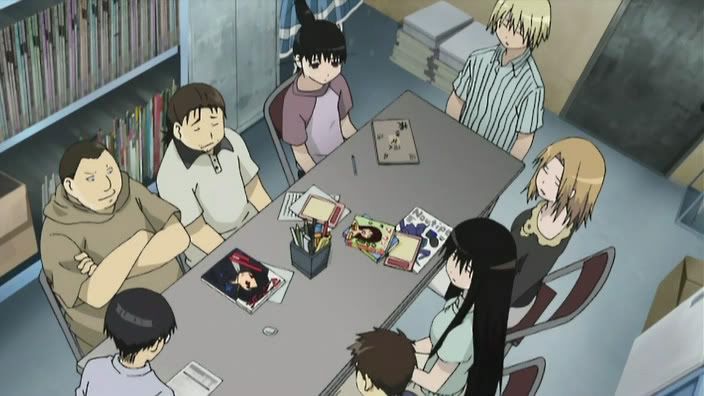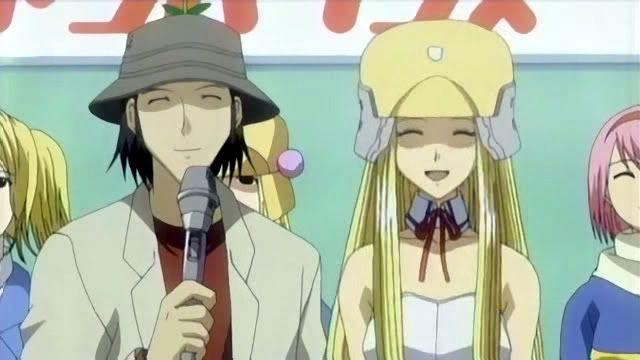Friday, May 23, 2008
Eye Creases and Beauty in Japan
The Japanese Think You Know Everything
One of the first things you learn as a foreigner in Japan is that people here will assume you're intimately familiar with every word written in katakana, the writing system used for expressing foreign words, just by being a native speaker of English. Although the majority of foreign-loan words do come from English, many are taken from other languages, such as the medical terms that were imported from German during the early 20th century, or various everyday words like ankeeto (questionnaire, from the French d'enquete) or arubaito (part time job, from the German arbeit). I remember trying to make curry back in my bachelor days and stumbling because I didn't know what the "ruu" the instructions called for was. (I now know it's roux, the French word for cubes of curry or consomme.) This assumption that every foreigner knows everything associated with America and Europe goes beyond words, too. I was asked by the PTA of the special English school my son attends if I thought the International Baccalaureate program would be a good base for students wishing to attend university in the U.S. I'd never heard of this system, which seemed to confuse the PTA members. I was a gaijin, wasn't I? How could I not know? They were disappointed when (after doing some research) I told them the IB program, which is widely accepted in Europe and elsewhere, wasn't officially recognized by most mainstream U.S. universities the students would likely attend, since Japan considers itself an honorary European nation.
Here's my proof: Japan and Europe have the same DVD region code!

Journey to the Sea at the Center of the Earth, or, Thor's Day???

Wednesday, May 21, 2008
TOTO, I've a feeling we're not in Kansas anymore
If you've ever visited Japan, you've probably answered the call of nature at some point, and seen the famous TOTO logo featured on most every toilet here. If you're a wise-cracking gaijin like me, you might have been compelled to say, "Toto, I've a feeling we're not in Kansas anymore." Or like my son says, 等々トイレを見つけた tohtoh toire o mitsuketa, "I finally found a toilet," since tohtoh also means "finally" or "after a long time." Toto is the largest toilet maker in Japan, and the fourth largest in the world, and if you've ever enjoyed the warm feeling of having your butt carefully washed and dried by your toilet, you have these people to thank, since the "Washlet" is their invention. The company was launched in 1916 in response to the need for Western-style sanitation as Japan grew more modern, and it experienced rapid growth during the rebuilding after the Great Kanto Earthquake of 1923. Like many Japanese company names such as Kyocera ("Kyoto Ceramics"), its name is an abbreviation, in this case Toyo Toki, or Oriental Porcelain. In addition to high-tech toilets, they invented the "unit bath," an easily constructed one-piece bath, sink and toilet room common in Japanese apartments. They also had a successful line of porcelain tableware, although I for one wouldn't want to eat off porcelain plates with that TOTO logo on it.
Apparently Toto is pushing hard to get Washlets accepted in the U.S., although sales are slow so far, with 1000 or so moving each month. By comparison, they're selling a million units a year in China. Click the image below to go to their site and see a pretty amazing website that will probably get you thinking about "that happy Washlet feeling." Clean is happy!
Genshiken



Mechanisms Behind the Harmonious Life in Japan
I write often about how harmonious Japan appears to foreigners living here. Seen from our special position as outsiders (which is what the word gaijin really means, after all), most Japanese seem to possess joshiki, a kind of "national common sense" which keeps them generally in sync with society at large; in cases where an individual moves away from accepted norms, the phenomenon of hito no me ("the eyes of others") will usually bring him around, or at least get him to keep his penchant for [fill in any slightly anti-social but fun activity here] hidden from general view. This tendency to get along with each other doesn't just happen automatically: there are concrete mechanisms in place that help make Japanese society the happy, feel-good place it is. When I walked to school back in the U.S. I walked alone, and my primary concern was avoiding getting beaten up by a bully along the way, but in Japan, kids walk to school together in a group called a han, with the oldest child acting as hancho (remember, "head honcho") which forces kids to interact socially in positive ways. Our larger neighborhood is divided into sections called kumi, which plan various community events, establish schedules of mothers who will stand along the route kids walk to school to make sure they're safe, and publish information on designated evacuation areas in the event of a disaster. They also distribute the kairanban (kai-rahn-bahn), a circular with information on various goings-on in the community, another subtle way of building social ties since it has to be manually passed from house to house. When I married my wife in 1994, I puzzled at the small speaker wired to one wall in their living room, out of which a calm voice would occasionally sound, announcing things like an ikebana class being held in the Community Center, or the all-important-in-fire-prone-Japan reminders to make sure your kerosene heaters are turned off at 10 pm. The system eventually fell out of use and the speaker was removed when we "reformed" our house (as they say in Japan, meaning remodel), but while it as hooked up I was amazed at the benevolent 1984-esque-ness of it all.
A kairanban is a clipboard with a list of names, and when you've seen the news on the clipboard you sign your name and take it to the next family. Do they have anything like this in the U.S.? Hmm, maybe the Amish do, come to think of it.

Monday, May 19, 2008
Useful Japanese: the Honorific "O"
An interesting aspect of Japanese polite grammar is the honorific "o" that goes in front of some words to give them a higher status. Various words that are especially important in Japanese society receive this prefix, like money (okane) or relationships like mother or grandmother (okaasan, obaasan). It's interesting to notice the patterns of words that take this unique honorific. For example, words having to do with death or Buddhism tend to take it (otera = temple, okoh = Buddhist incense), yet words related to Japan's Shinto religion usually don't. English words don't take the honorific, with the exception of o-new, a slang word for something purchased recently that's very important to you. Adding the honorific "o" to words sort of "softens" it, so words related to children or babies often feature it (omaru = child's potty, omutsu = diapers, oshiri = a cute word referring to a person's rear end). An alternative reading for the "o" kanji is "go" and some words have "go" on the front instead (such as gohan, a polite word for rice or any food). Conceptually, "o" and "go" are exactly the same, since they're written with the same kanji character.


